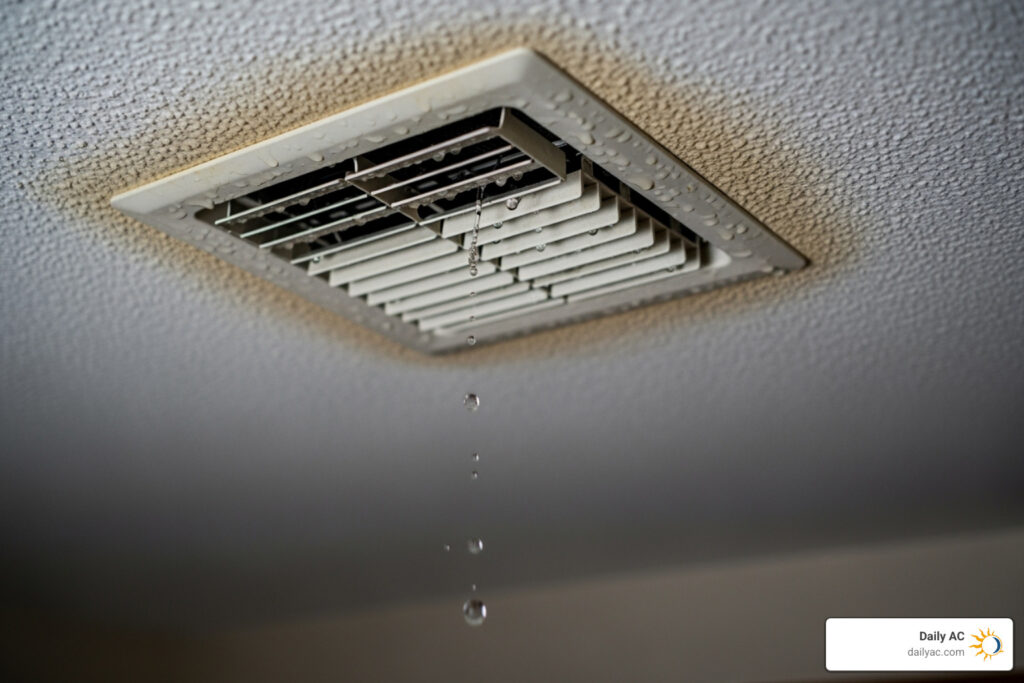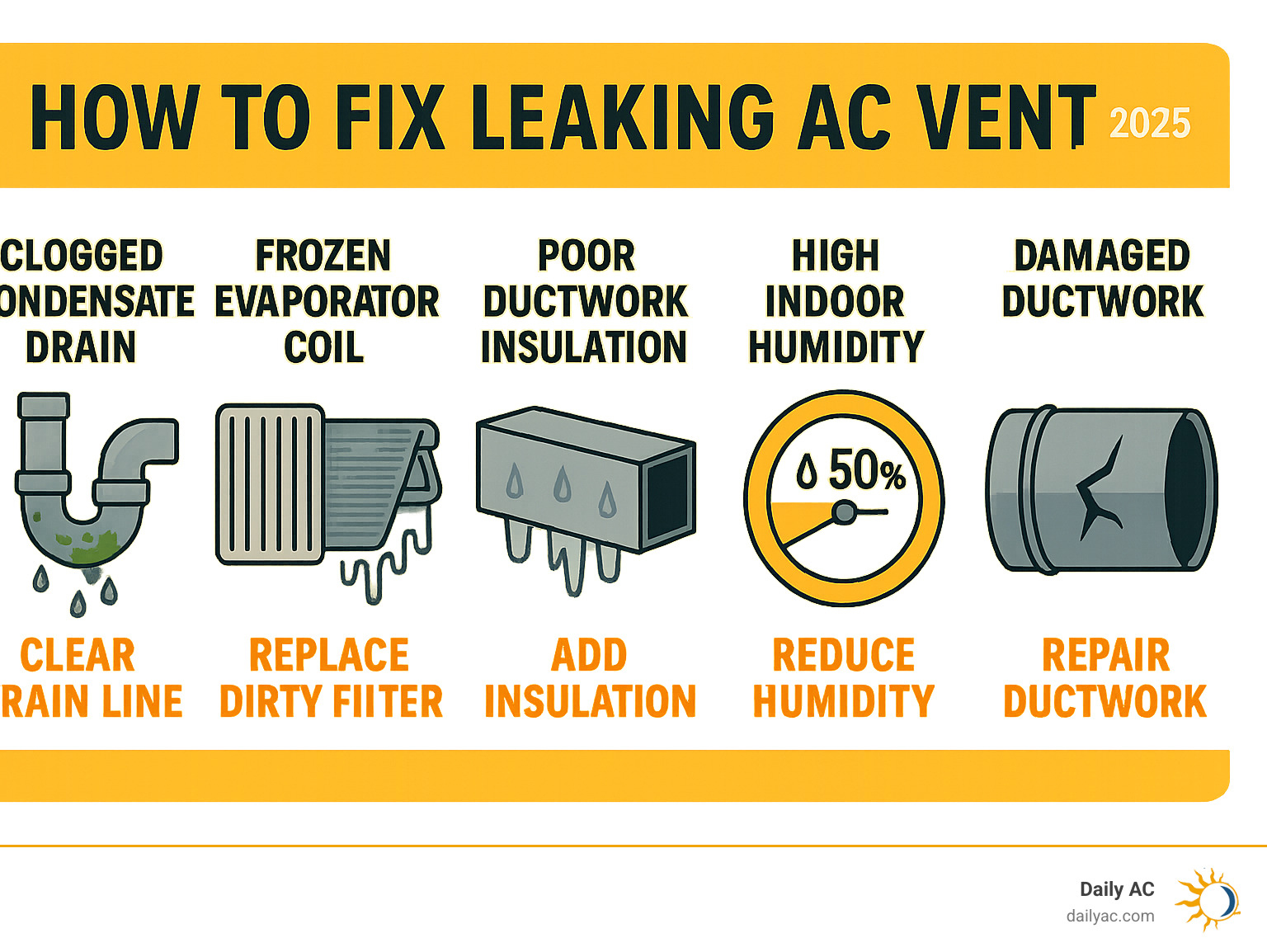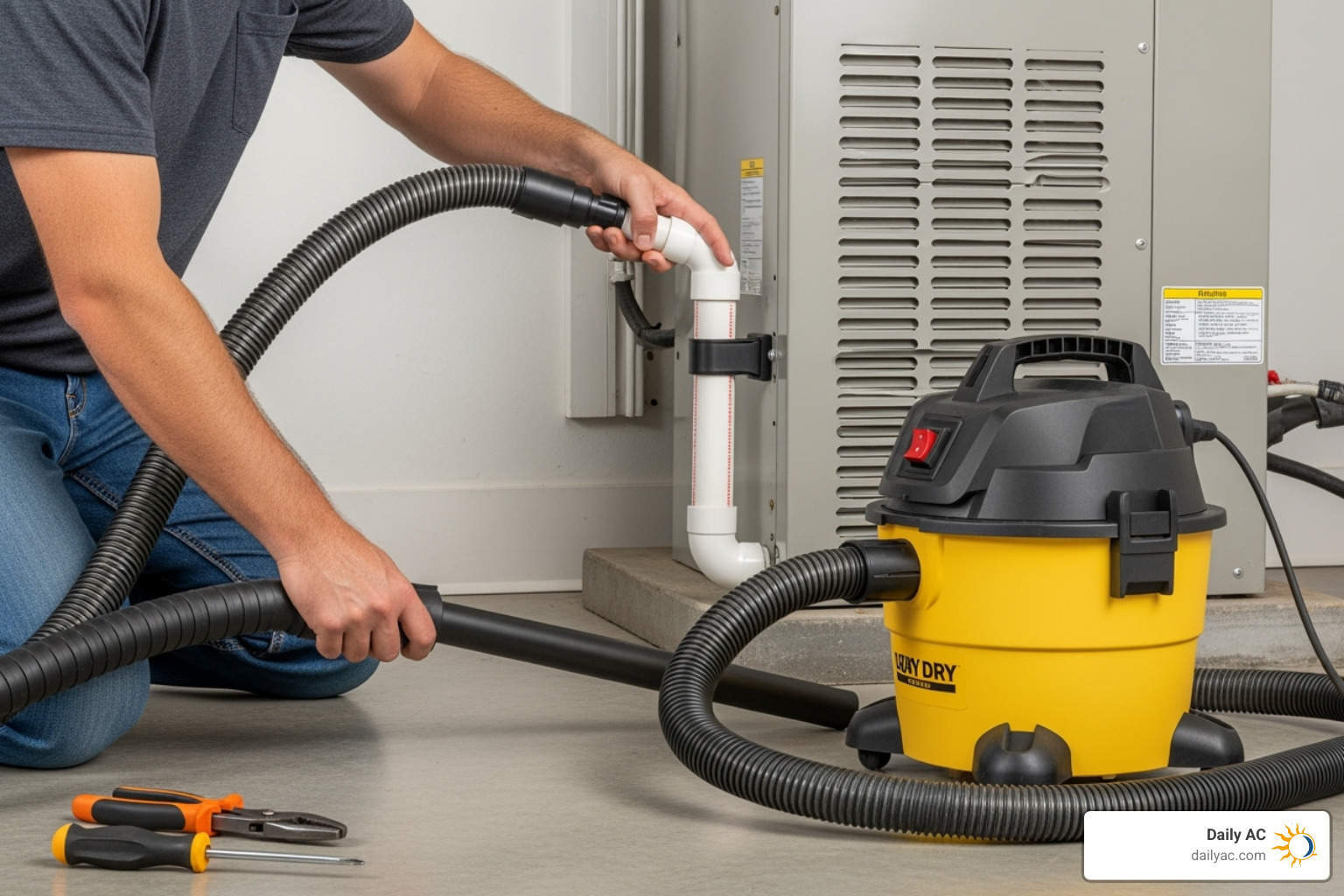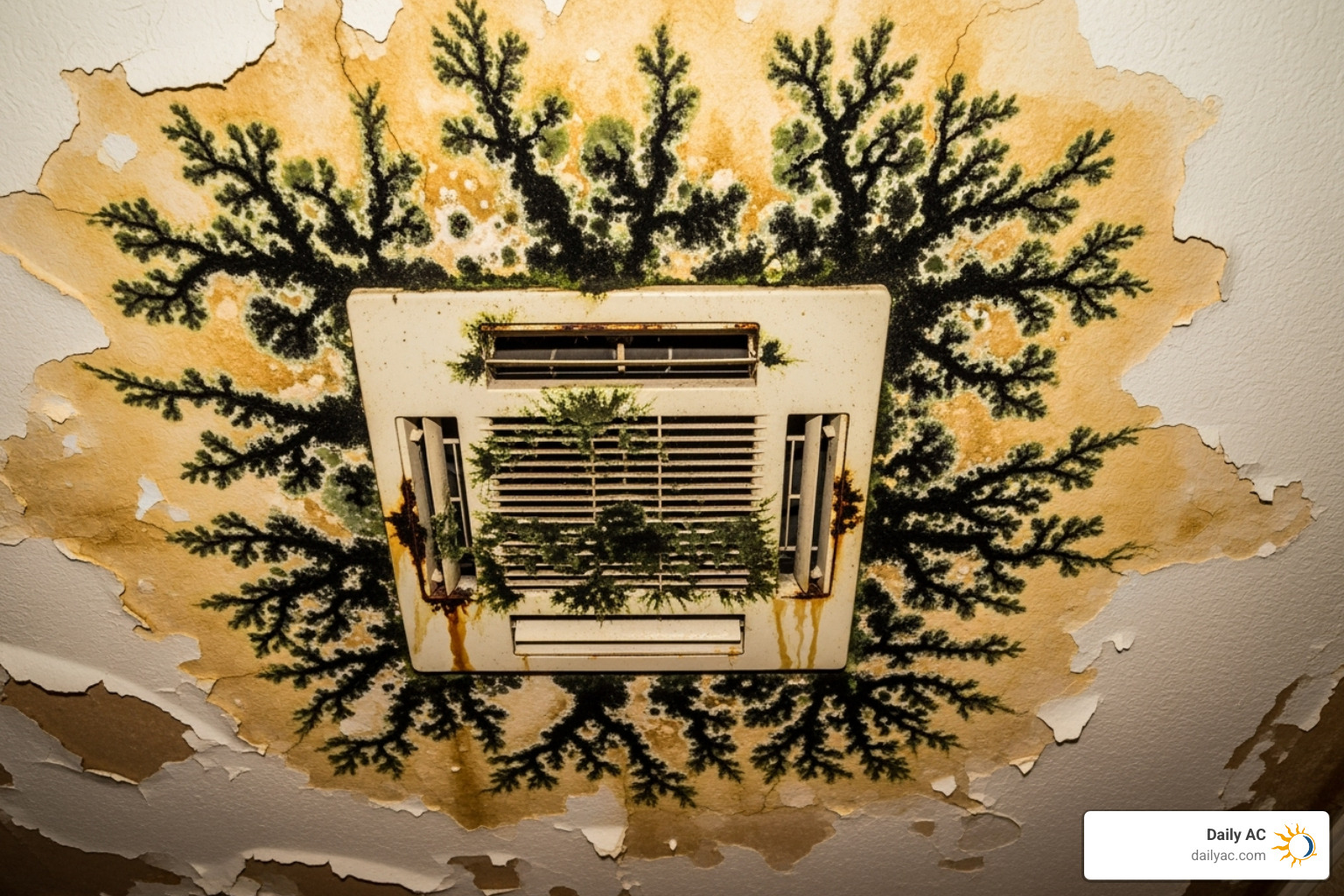Why Your AC Vent Is Leaking Water (And How to Stop It)
If you’re wondering how to fix leaking ac vent issues, here are the most common solutions:
- Replace dirty air filter – Restricted airflow causes coils to freeze and leak when thawing
- Clear condensate drain line – Use a wet/dry vacuum to remove algae and debris clogs
- Seal leaky ductwork – Apply mastic sealer to cracks and gaps in unconditioned spaces
- Reduce indoor humidity – Install a dehumidifier to maintain 30-50% humidity levels
- Call a professional – For refrigerant leaks, broken pumps, or persistent issues
Water dripping from an AC vent is a warning sign of a problem with your HVAC system. Common causes like a clogged condensate drain, frozen evaporator coils, or poor ductwork insulation can lead to water damage, mold growth, and expensive repairs if ignored.
The good news is that many leaks are fixable with basic DIY skills. HVAC professionals find the most common culprits are dirty air filters, clogged drain lines, and poorly insulated ducts.
Don’t ignore that drip. Research shows that leaky air ducts can lose up to 30% of conditioned air, driving up your energy bills while water damage repair costs can reach upwards of $6,000.
Why Is Water Dripping From Your AC Vent? Common Causes
That dripping from your AC vent means something is wrong. To learn how to fix leaking ac vent problems, you first need to identify the cause.
The signs of leaks are usually obvious. Look for water stains on your ceiling, musty odors, puddles on the floor, or higher than usual humidity. Most leaks stem from a few common, fixable culprits.
Clogged Condensate Drain Line
Air conditioners act as dehumidifiers, pulling moisture from the air via condensation. This water collects in a drain pan and exits through a PVC pipe known as the condensate drain line.
Over time, algae buildup, dirt, and debris can clog this pipe. With nowhere to go, the water backup overflows the drain pan, seeps into your ductwork, and drips from your vents. This is one of the most common causes of AC leaks and is often an easy fix.
Frozen Evaporator Coils
Your evaporator coil is where the cooling happens, but sometimes it can freeze. When it thaws, the excess water can cause leaks.
A dirty air filter is the usual suspect. A clogged filter restricts airflow, preventing warm air from passing over the coil. This causes the coil to get too cold, leading to ice formation.
Low refrigerant can also cause freezing. If your system is low on this cooling fluid due to refrigerant issues or leaks, the pressure drops, and the coil gets too cold. During the thawing process, the melting ice overwhelms the drain pan, causing it to overflow.
Ductwork and Insulation Problems
Your ductwork carries cool air throughout your home. If ducts in hot spaces like attics aren’t insulated properly, condensation on ducts can form, much like on a cold glass on a hot day.
Poor insulation is the main issue. When a cold duct surface meets hot attic air, moisture forms on the outside of the ducts and can drip into your living space.
Damaged ducts worsen the problem. Cracks or loose connections allow humid air into the system. Leaky air ducts can lose significant amounts of conditioned air—up to 30%—which means you’re paying to cool your attic instead of your home.
High Indoor Humidity
Sometimes the problem is simply too much excess moisture in your home’s air. When humid indoor air meets the cool surface of your AC vents, condensation on vents forms.
The ideal humidity level for a home is between 30-50%. Higher humidity causes vents to “sweat.” While your AC provides some dehumidification, it may not be enough to handle serious moisture issues.
Poor bathroom ventilation is a common contributor. Steam from hot showers increases indoor humidity if not properly vented outside, leading to condensation on cool surfaces like AC vents.
DIY Guide: How to Fix a Leaking AC Vent
Don’t panic if you see a dripping AC vent. Many issues are easy to fix yourself with basic tools, saving you from a costly repair bill.
Before you begin, prioritize safety: Always turn off your AC system completely before starting any work. Gather a few common tools: a wet/dry vacuum, screwdriver, a soft brush, white vinegar, mastic sealer or metal foil tape, a flashlight, and towels.
We’ll check the most common culprits one by one to find the source of your leak.
Step 1: Turn Off Your AC System
This is a critical safety step. Never work on your HVAC system while it’s running.
First, switch your thermostat to “Off.” Then, go to your electrical panel and flip the circuit breaker for your HVAC unit. This ensures electrical safety by preventing the system from turning on unexpectedly.
Shutting the system down also allows any frozen coils to thaw completely, which helps with diagnosis and can prevent further damage.
Step 2: Inspect and Replace the Air Filter
A dirty air filter is a common culprit behind AC vent leaks.
Locate your filter, which is usually in the indoor air handler or behind a large return air vent. Pull it out for inspection.
Check for dirt buildup. If the filter is clogged, it’s likely your problem. A clogged filter restricts airflow, causing the evaporator coil to freeze. When the ice thaws, the excess water overflows and drips through your vents.
Replace the dirty filter with a clean one of the correct size. This simple step will improve airflow and is the best way to achieve frozen coil prevention. Remember to check your filter every 1-3 months.
Step 3: How to fix a leaking AC vent by clearing the condensate drain
If the air filter is clean, check the condensate drain line. This PVC pipe can get clogged with algae and debris.
Locate the drain line, a PVC pipe running from your indoor air handler to the outside or a floor drain. Find the access cap or T-shaped vent near the air handler.
Use your wet/dry vacuum on the outdoor end of the drain line to clear the clog. Create a tight seal with a rag or tape and run the vacuum for 2-3 minutes. Gurgling sounds mean the clog is clearing.
Afterward, flush with a vinegar solution. Pour a 50/50 mix of distilled white vinegar and water down the access opening. The vinegar kills algae and prevents future buildup. Performing this maintenance every six months will help you remove clogs and prevent future issues.
Step 4: Inspect and Seal Leaky Ductwork
If the filter and drain line are clear, inspect your ductwork. Head to unconditioned spaces like your attic or crawl space where ducts are located.
Perform a visual inspection for gaps, tears, or disconnected joints. Check for moisture on the duct exterior, especially near the air handler.
To seal affected areas, use mastic sealer for small gaps and cracks. This paste creates a durable, airtight seal. For seams and small holes, use metal foil tape. Avoid standard duct tape, as it degrades over time and is not a permanent solution for how to fix leaking ac vent problems. Minor ductwork repairs are often a manageable DIY task that can stop leaks and improve system efficiency.
When to Call a Professional HVAC Technician
While DIY repairs are satisfying, for how to fix leaking ac vent issues, sometimes it’s smarter to call a professional. Some situations require the expertise and specialized tools that only an HVAC technician has. Attempting complex repairs yourself can worsen the problem and lead to higher costs.
The Dangers of Ignoring a Leaking Vent
Ignoring a small drip can lead to bigger problems. What seems harmless can cause significant issues behind the scenes.
- Structural damage: Water can seep into wooden beams, weaken drywall, and saturate insulation, leading to sagging ceilings and crumbling plaster.
- Mold and mildew: Moisture creates a breeding ground for mold, which can cause unsightly stains, musty odors, and health risks, especially for those with allergies or respiratory issues.
- Electrical hazards: Water near electrical wiring is a dangerous combination that can cause short circuits, fires, or electric shock.
- Reduced AC efficiency: A leaking system works harder, leading to higher energy bills as it consumes more power.
Water damage repairs can be costly, which is why addressing leaks promptly is so important.
Signs You Need an HVAC Technician for a Leaking AC Vent
Knowing when to call for professional help can save you time, money, and stress. Here are clear signs it’s time to call a technician:
- DIY efforts fail: If you’ve changed the filter, cleaned the drain, and sealed ducts but the leak persists, a deeper issue likely requires professional diagnosis.
- Suspected refrigerant leaks: If your AC blows warm air, runs constantly, or makes a hissing sound, you may have a refrigerant leak. Handling refrigerant requires certification and specialized equipment.
- Major duct damage: Large tears, widespread disconnections, or damage in inaccessible areas (like behind walls) require professional repair.
- A broken condensate pump: If your AC unit uses a pump to remove water and it fails, water will back up quickly. Replacing these involves electrical work and is best left to a pro.
- Persistent freezing coils: If your coil repeatedly freezes despite clean filters and good airflow, you could have low refrigerant or a malfunctioning component.
- Unexplained water source: The leak might not be from your AC. For example, a roof leak could be traveling down the ductwork. A professional can determine the true source.
An HVAC inspection is a small investment that can prevent much larger problems.
What to Expect from a Professional Repair
When you call Daily AC, you get a thorough, systematic approach to find the root cause of the problem.
- Comprehensive System Diagnosis: Our technicians examine your entire HVAC system using specialized tools like moisture meters or infrared cameras to find hidden problems.
- Duct Pressure Testing: For suspected ductwork issues, we can pressurize the system to measure air loss and pinpoint every leak.
- Transparent Quoting: We explain the problem in plain English and provide a detailed cost estimate with no confusing jargon.
- Efficient Repair Timeline: We work efficiently to get your system running again, providing a realistic timeline for the repair.
- Preventative Recommendations: We provide advice to help you avoid future leaks and keep your HVAC system healthy.
Frequently Asked Questions about Leaking AC Vents
We’ve helped many homeowners in Davie, Plantation, and Miramar with leaking AC vents. Here are the most common questions we hear.
Can a dirty air filter really cause my AC vent to leak?
Yes, absolutely. A dirty air filter is one of the most common reasons for how to fix leaking ac vent calls. A clogged filter restricts airflow over the evaporator coil, causing it to get too cold and form ice. When the AC cycles off, the melting ice can overwhelm the drain pan, overflow into the ductwork, and drip from your vents.
Regular filter changes are the easiest way to prevent this. Check your filter monthly and replace it every 1-3 months.
How often should I perform maintenance to prevent leaks?
Consistent maintenance is key to preventing leaks. We recommend the following schedule:
- Annual HVAC inspections: A professional can spot potential issues like drain clogs or low refrigerant before they cause leaks and water damage.
- Clean condensate drain line (every six months): Use a vinegar solution to prevent algae and mold buildup that causes clogs.
- Change air filters (every 1-3 months): This is crucial for maintaining proper airflow.
- Check ductwork occasionally: Look for visible damage or disconnected joints in your attic or crawl space.
Is the water dripping from my AC vent dangerous?
The water is just condensation and isn’t harmful to touch. The real danger lies in ignoring the leak.
- Mold growth: The moisture creates a perfect environment for mold, which can cause health issues like respiratory problems and allergic reactions.
- Electrical shock hazard: If the leak reaches electrical wiring, it can create a serious risk of shock or fire. Always turn off the power before any DIY work.
- Structural damage: Persistent leaks can weaken ceiling joists, damage drywall, and ruin insulation, leading to expensive repairs.
A leaking AC vent is a call for help. Address it quickly to protect your family’s health and your home.
Conclusion: Keep Your Home Dry and Comfortable
A dripping AC vent is a sign that your HVAC system needs attention. The main causes are clogged condensate drains, frozen evaporator coils, poorly insulated ductwork, and high indoor humidity.
Many homeowners can fix these issues by changing a dirty air filter, clearing the drain line with a wet/dry vacuum, or sealing ductwork gaps. These simple steps can often solve the problem.
However, knowing when to call an expert is as important as knowing how to fix leaking ac vent issues yourself. If DIY fixes fail or you suspect refrigerant leaks, major duct damage, or persistent freezing, it’s time for professional help. Don’t let a small problem become a big headache.
At Daily AC, we understand how frustrating HVAC problems are. Our friendly team serves homeowners in Davie, Plantation, and Miramar, focusing on customer relationships and high-quality service, unlike larger, volume-focused companies.
Whether you need an emergency repair or preventative maintenance, we’re here to keep your home comfortable. A small investment in professional care today can prevent thousands in water damage repairs tomorrow.
Schedule professional ductwork services in Davie, FL and let us help you maintain a dry, healthy, and comfortable home.








